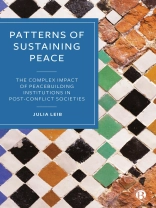This book explores how to establish peace in societies recovering from large-scale, armed conflicts by introducing the sustaining peace scale as a continuous measure for peacebuilding success.
Drawing on an extensive data collection of peacebuilding episodes over almost three decades, the author analyses the impact of four peacebuilding practices – international commitment, power-sharing, security sector reform and transitional justice. Having established the framework, the author applies it to the peacebuilding processes in Sierra Leone and South Africa.
An important contribution to the literature on successful peacebuilding, this book will be essential reading for peacebuilding scholars and practitioners.
Innehållsförteckning
1. Introduction: The Challenges of Institutional Peacebuilding
2. How to Assess Peacebuilding Success: Conceptualizing the Sustaining Peace Scale
3. Liberal Peacebuilding, Path Dependence and Commitment Problems
4. A Set-Theoretic, Multi-Method Approach to Peacebuilding
5. Institutional Patterns of Peacebuilding Success
6. Assisted Accountability in Sierra Leone
7. The Spoils-of-Peace Approach in South Africa
8. Conclusion: How a Focus on Configurations Provides New Insights for Peacebuilding Research
Om författaren
Julia Leib is Postdoctoral Researcher at the University of Potsdam, Germany.












